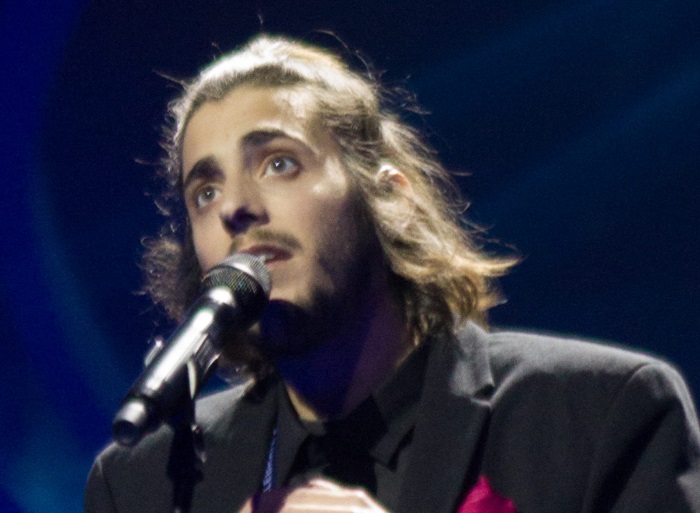Salvador Sabral’s victory for Portugal in the Eurovision Song Contest this year is the first time that a non-English Eurovision song has won the coveted crown since 2007. Salvador performed Amar Pelos Dois (Love For Both) at the Grand Final in Kiev to an enraptured crowd. One of the most interesting elements of the singer’s performance was that the bossa nova was entirely in Portuguese, written and composed by his sister.
A Pitch-Perfect Performance from Portugal
2017 is the first time that Portugal has finished in the top 5 at Eurovision. The emotive song was well-received by the audience, who held their lighters aloft and swayed in time to the pitch-perfect performance.
The judges and audience clearly also loved the delicate-sounding song and voted Portugal into top position with the final score on the leaderboard reaching 758 points.
One being declared the winner, Salvador was joined on stage by his sister Luísa, the composer of Amar Pelos Dois and they performed the winning song again together.
Non-English Eurovision 2017 Songs
There were seven non-English Eurovision songs in the competition this year. In addition to the winners Portugal, the other entries with non-English lyrics in Eurovision 2017 came from Spain, Italy, Belarus, Croatia, France and Hungary.
Another high-performing song in the Grand Final, Italy’s Occidentali’s Karma (The West’s Karma) sung by Francesco Gabbani was another non-English Eurovision song. This pop entry was sung entirely in Italian with the odd English phrase, most notably ‘singing in the rain’ which appeared just before the chorus.
Hungary’s Origo was sung by Joci Papai entirely in Hungarian. The performance was atmospheric and Hungary finished in 8th place, their best ever position.
France’s Alma performed Requiem half in French and half in English. Initially, the song was entirely in French but was revamped for Eurovision and the chorus sung in English. The song did well and France finished in 12th place.
Another non-English Eurovision entry this year was Croatia’s My Friend, performed by Jacques Houdek. This was sung in a combination of English and Italian in two personas – one a pop singer and the other an opera singer. Finishing in 13th place, the innovative performance even saw Houdek dressing in two halves to match his separate characters!
Belarus’s Naviband performed Story of My Life in Belarusian and the crowd enjoyed this lively and colourful song. The performance saw them qualify for the Grand Final when two previous English language entries did not.
Spain’s Do It For Your Lover by Manel Navarro finished in last place with just 5 points, awarded by Portuguese viewers. The song was originally in English but was changed to include Spanish verses at the last minute . Unfortunately the song did not resonate with judges or viewers, despite its emotional lyrics and catchy chorus.
Record Viewing Figures
On YouTube the Grand Final was watched by 4 million people, a record-breaking number, while the total figure for viewers around the world was 200 million.
Bulgaria finished in second place this year with 615 points, a long way in front of Moldova who came third with 374 points. Beligium finished in 4th place and Sweden finished in 5th. After being tipped as the favourites, Italy eventually finished in 6th place.
Previous Non-English Eurovision Songs
Most of the songs in the annual contest have been sung in English. The last non-native Eurovision song to win in the Grand Final was Serbia’s Molitva in 2007, performed Maria Serifovic. This ballad won Serbia the trophy ahead of Ukraine’s entry Lasha Tumbai, performed by Verka Serduchka.
Ukraine’s song made use of a number of different languages, combining German, English, Ukrainian and even a bit of Mongolian.
Before Serbia’s Eurovision victory in 2007, Israel was the most recent winner to take the trophy with a non-English Eurovision song, Diva by Dana International in 1998.
History of Languages in Eurovision
Since the contest’s first airing in 1956, there have been entries sung in 56 different languages. However, despite the many languages and dialects on show over the years, all the winning songs have been sung in just 12 different languages.
Serbia, Croatia and Denmark have all won singing in their own native languages. However, since 1992 Eurovision has only been won three times in languages other than English.
The only country to always avoid English in the Eurovision Song Contest is France, who have only ever used French or a version of French in their 57 performances. The exception is this year, where their entry had an English chorus.
There have been 14 French language Eurovision winners, including France, Switzerland, Luxembourg, Monaco and Belgium.
In total, 29 of the 62 Eurovision song contest winners have sung in English, which makes 46.7% of the total. Ireland and the UK have won Eurovision 12 times between them. So this means 58% of winners have sung their performance in English as a non-native language.
We love to hear different languages in Eurovision as this makes the contest more diverse and interesting. It would be wonderful to hear languages each year.
Portugal’s stunning victory with Amar Pelos Dois is hopefully a sign that we will see more non-English Eurovision entries in future. After all, the slogan for Eurovision this year is Celebrate Diversity!
What do you think about non-English Eurovision songs?
Do you like hearing different languages in Eurovision?
Or do you think countries should always use English, so that more audiences can understand the lyrics?
Now that Australia take part, do you think the USA should be invited to join the competition?
Attributions
- “Salvador Sobral” by Roger Dewayne Barkley, EuroVisionary is licensed under a Creative Commons Attribution-ShareAlike 4.0 International License.

